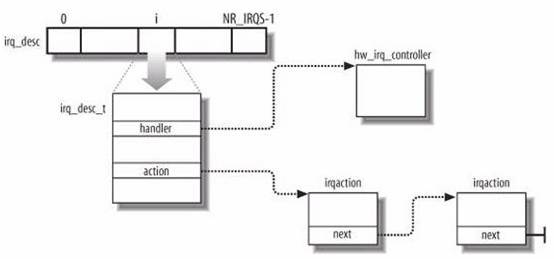中断处理模型结构
中断处理模型如下图所示,

其中NR_IRQS表示最大的中断号,在include/asm/arch/irq.h中定义。
irq_desc[]是一个指向irq_desc_t结构的数组, irq_desc_t结构是各个设备中断服务例程的描述符。Irq_desc_t结构体中的成员action指向该中断号对应的irqaction结构体链表。Irqaction结构体定义在include/linux/interrupt.h中,如下:
truct irqaction {
irq_handler_t handler; //中断处理函数,注册时提供
unsigned long flags; //中断标志,注册时提供
cpumask_t mask; //中断掩码
const char *name; //中断名称
void *dev_id; //设备id,本文后面部分介绍中断共享时会详细说明这个参数的作用
struct irqaction *next; //如果有中断共享,则继续执行,
int irq; //中断号,注册时提供
struct proc_dir_entry *dir; //指向IRQn相关的/proc/irq/n目录的描述符
};
2.6.32内核的irqaction为:
- struct irqaction {
- irq_handler_t handler;
- unsigned long flags;
- const char *name;
- void *dev_id;
- struct irqaction *next;
- int irq;
- struct proc_dir_entry *dir;
- irq_handler_t thread_fn;
- struct task_struct *thread;
- unsigned long thread_flags;
- };
在注册中断号为irq的中断服务程序时,系统会根据注册参数封装相应的irqaction结构体。并把中断号为irq的irqaction结构体写入irq_desc [irq]->action。这样就把设备的中断请求号与该设备的中断服务例程irqaction联系在一起了。样当CPU接收到中断请求后,就可以根据中断号通过irq_desc []找到该设备的中断服务程序。
以下为中断请求函数:
- int request_threaded_irq(unsigned int irq, irq_handler_t handler,
- irq_handler_t thread_fn, unsigned long irqflags,
- const char *devname, void *dev_id)
- {
- struct irqaction *action;
- struct irq_desc *desc;
- int retval;
- /*
- * handle_IRQ_event() always ignores IRQF_DISABLED except for
- * the _first_ irqaction (sigh). That can cause oopsing, but
- * the behavior is classified as "will not fix" so we need to
- * start nudging drivers away from using that idiom.
- */
- if ((irqflags & (IRQF_SHARED|IRQF_DISABLED)) ==
- (IRQF_SHARED|IRQF_DISABLED)) {
- pr_warning(
- "IRQ %d/%s: IRQF_DISABLED is not guaranteed on shared IRQs\n",
- irq, devname);
- }
- #ifdef CONFIG_LOCKDEP
- /*
- * Lockdep wants atomic interrupt handlers:
- */
- irqflags |= IRQF_DISABLED;
- #endif
- /*
- * Sanity-check: shared interrupts must pass in a real dev-ID,
- * otherwise we'll have trouble later trying to figure out
- * which interrupt is which (messes up the interrupt freeing
- * logic etc).
- */
- if ((irqflags & IRQF_SHARED) && !dev_id)
- return -EINVAL;
- desc = irq_to_desc(irq); //把申请中断号加下中断链表
- if (!desc)
- return -EINVAL;
- if (desc->status & IRQ_NOREQUEST)
- return -EINVAL;
- if (!handler) {
- if (!thread_fn)
- return -EINVAL;
- handler = irq_default_primary_handler;
- }
- action = kzalloc(sizeof(struct irqaction), GFP_KERNEL);
- if (!action)
- return -ENOMEM;
- action->handler = handler; //此处开始根据注册参数封装相应的irqaction结构体
- action->thread_fn = thread_fn;
- action->flags = irqflags;
- action->name = devname;
- action->dev_id = dev_id;
- chip_bus_lock(irq, desc);
- retval = __setup_irq(irq, desc, action);
- chip_bus_sync_unlock(irq, desc);
- if (retval)
- kfree(action);
- #ifdef CONFIG_DEBUG_SHIRQ
- if (irqflags & IRQF_SHARED) {
- /*
- * It's a shared IRQ -- the driver ought to be prepared for it
- * to happen immediately, so let's make sure....
- * We disable the irq to make sure that a 'real' IRQ doesn't
- * run in parallel with our fake.
- */
- unsigned long flags;
- disable_irq(irq);
- local_irq_save(flags);
- handler(irq, dev_id);
- local_irq_restore(flags);
- enable_irq(irq);
- }
- #endif
- return retval;
- }
* request_threaded_irq - allocate an interrupt line
* @irq: Interrupt line to allocate
* @handler: Function to be called when the IRQ occurs.
* Primary handler for threaded interrupts
* If NULL and thread_fn != NULL the default
* primary handler is installed
* @thread_fn: Function called from the irq handler thread
* If NULL, no irq thread is created
* @irqflags: Interrupt type flags
* @devname: An ascii name for the claiming device
* @dev_id: A cookie passed back to the handler function
* Flags:
*
* IRQF_SHARED Interrupt is shared
* IRQF_DISABLED Disable local interrupts while processing
* IRQF_SAMPLE_RANDOM The interrupt can be used for entropy
* IRQF_TRIGGER_* Specify active edge(s) or level
老版的request_irq 则调用 request_threaded_irq 如下:
- request_irq(unsigned int irq, irq_handler_t handler, unsigned long flags,
- const char *name, void *dev)
- {
- return request_threaded_irq(irq, handler, NULL, flags, name, dev);
- }
阅读(1932) | 评论(0) | 转发(0) |
